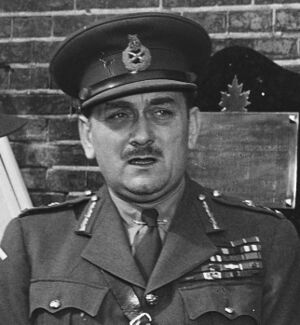Difference between revisions of "Charles Foulkes"
(from Wikipedia) |
m (Text replacement - "was serving as " to "was ") |
||
| Line 20: | Line 20: | ||
Foulkes was born in [[Stockton-on-Tees]], England and joined the [[Canadian Army]] in 1926.<ref name=juno>[http://www.junobeach.org/e/3/can-pep-can-foulkes-e.htm Juno Beach Centre Biography]</ref> In 1937 he attended the [[Staff College, Camberley|Staff College]] in [[Camberley]], England.<ref name=juno/> | Foulkes was born in [[Stockton-on-Tees]], England and joined the [[Canadian Army]] in 1926.<ref name=juno>[http://www.junobeach.org/e/3/can-pep-can-foulkes-e.htm Juno Beach Centre Biography]</ref> In 1937 he attended the [[Staff College, Camberley|Staff College]] in [[Camberley]], England.<ref name=juno/> | ||
| − | In 1939, Foulkes was | + | In 1939, Foulkes was a major with the 3rd Brigade of the [[1st Canadian Infantry Division]].<ref name=juno/> He went on to be a [[General Staff Officer]] with [[3rd Canadian Infantry Division]].<ref name=juno/> After serving as a [[Brigade]] [[Commander]] from August 1942, he was appointed [[General Officer Commanding]] [[2nd Canadian Infantry Division]] in January 1944 and led the division through the [[Operation Overlord|Normandy Campaign]].<ref name=juno/> In November 1944 he was made General Officer Commanding [[I Canadian Corps]] in [[Italy]].<ref name=juno/> |
[[File:1st Canadian generals.jpg|thumb|left|Senior commanders of the [[First Canadian Army]], May 1945. Seated from the left: [[Stanisław Maczek]] (Polish Army), [[Guy Simonds]], [[Harry Crerar]], Charles Foulkes, [[Bert Hoffmeister]]. Standing from the left: [[Ralph Holley Keefler|Ralph Keefler]], [[Bruce Matthews (Canadian Army officer)|Bruce Matthews]], [[Harry Wickwire Foster|Harry Foster]], [[Robert Moncel]] (standing in for [[Christopher Vokes|Chris Vokes]], [[Stuart Blundell Rawlins|Stuart Rawlins]] (British Army).]] | [[File:1st Canadian generals.jpg|thumb|left|Senior commanders of the [[First Canadian Army]], May 1945. Seated from the left: [[Stanisław Maczek]] (Polish Army), [[Guy Simonds]], [[Harry Crerar]], Charles Foulkes, [[Bert Hoffmeister]]. Standing from the left: [[Ralph Holley Keefler|Ralph Keefler]], [[Bruce Matthews (Canadian Army officer)|Bruce Matthews]], [[Harry Wickwire Foster|Harry Foster]], [[Robert Moncel]] (standing in for [[Christopher Vokes|Chris Vokes]], [[Stuart Blundell Rawlins|Stuart Rawlins]] (British Army).]] | ||
Latest revision as of 15:12, 22 August 2022
(officer) | |
|---|---|
 | |
| Born | 3 January 1903 Stockton-on-Tees, England |
| Died | 12 September 1969 (Age 66) Ottawa, Ontario, Canada |
| Nationality | Canadian |
| Alma mater | Staff College (Camberley) |
Canadian soldier who attended the 1961 Bilderberg
| |
General Charles Foulkes was a British-Canadian soldier, and an officer of The Royal Canadian Regiment.
Military career
Foulkes was born in Stockton-on-Tees, England and joined the Canadian Army in 1926.[1] In 1937 he attended the Staff College in Camberley, England.[1]
In 1939, Foulkes was a major with the 3rd Brigade of the 1st Canadian Infantry Division.[1] He went on to be a General Staff Officer with 3rd Canadian Infantry Division.[1] After serving as a Brigade Commander from August 1942, he was appointed General Officer Commanding 2nd Canadian Infantry Division in January 1944 and led the division through the Normandy Campaign.[1] In November 1944 he was made General Officer Commanding I Canadian Corps in Italy.[1]

On 4 May 1945, south of Hamburg, Field Marshal Sir Bernard Law Montgomery accepted the unconditional surrender of the German forces in the Netherlands, northwest Germany including all islands, in Denmark and all naval ships in those areas. The surrender preceded the end of World War II in Europe and was signed in a carpeted tent at Montgomery's headquarters on the Timeloberg hill at Wendisch Evern.
On 5 May 1945, Foulkes summoned German General Blaskowitz to the Hotel de Wereld in Wageningen to discuss the surrender of German forces in the Netherlands. His Royal Highness Prince Bernhard, acting as commander in chief of the Dutch Interior Forces, attended the meeting as well. Blaskowitz agreed with all of the proposals made by Foulkes. However, nowhere in the building – some sources claim: nowhere in the whole town – could a typewriter be found. Thus the surrender document could not be typed. The next day, May 6, both parties returned, and in the presence of both General Foulkes and Prince Bernhard, Blaskowitz signed the surrender document which in the meantime had been typed.[Is that the whole story?][2]
After the war, Foulkes was appointed Chief of the General Staff and, in 1951, the first Chairman of the Chiefs of Staff.[1] He retired in 1960.[1]
In 1968 he was made a Companion of the Order of Canada. He taught at Carleton University in 1968 and 1969.[3] He died in Ottawa in 1969.
His medals and other personal artifacts are on display at the Royal Canadian Regiment Museum in London, Ontario. He was awarded the Honorary degree of Doctor of Laws (LL.D) from the University of Western Ontario on 11 June 1947.[4]
Event Participated in
| Event | Start | End | Location(s) | Description |
|---|---|---|---|---|
| Bilderberg/1961 | 21 April 1961 | 23 April 1961 | Canada Quebec St-Castin | The 10th Bilderberg, the first in Canada and the 2nd outside Europe. |
References
Wikipedia is not affiliated with Wikispooks. Original page source here